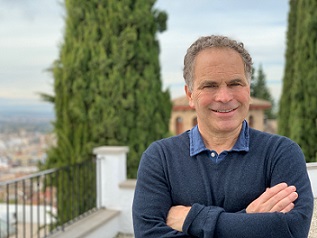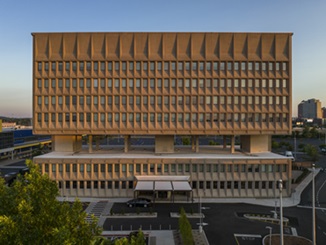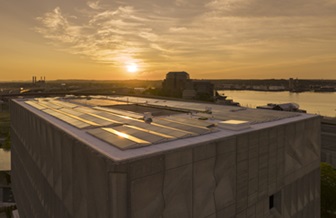
NEW HAVEN, CONN.—Just a few weeks ago, it was announced that the anticipated net-zero energy Hotel Marcel New Haven, Tapestry Collection by Hilton, has achieved Passive House certification from Passive House Institute (PHI).
The accomplishment is one in a long series of accomplishments for Bruce Redman Becker, architect and developer of the 165-room hotel that once was the Armstrong Rubber Company Building, aka Pirelli Building.
Green Lodging News spoke with Becker to learn about the Passive House certification and to get caught up on how his LEED Platinum building has performed since it opened in May 2022.
According to the Passive House Institute, at the heart of that organization’s certification is thermal insulation, windows that are well insulated and fitted with low-e glazings, ventilation heat recovery, airtightness of the building, and absence of thermal bridges—an area or component of an object which has higher thermal conductivity than the surrounding materials, creating a path of least resistance for heat transfer.
Ahead of the Curve
As an architect in the green building space, Becker had been familiar with Passive House certification for about five years before pursuing it for Hotel Marcel.
 “As part of our goal to be a zero-emission hotel and create as much energy on site, you have to look at not using more energy then you have to and that is where Passive House comes into play,” Becker says. “It is like putting the building on an energy diet. You must be meticulous about the insulation, the quality of the building envelope, you want the windows to be well insulated, and manage solar gain with shading and a low-e coating. You recover the thermal value of the air and have super high efficiency energy air ventilation.”
“As part of our goal to be a zero-emission hotel and create as much energy on site, you have to look at not using more energy then you have to and that is where Passive House comes into play,” Becker says. “It is like putting the building on an energy diet. You must be meticulous about the insulation, the quality of the building envelope, you want the windows to be well insulated, and manage solar gain with shading and a low-e coating. You recover the thermal value of the air and have super high efficiency energy air ventilation.”
At Hotel Marcel, triple-glaze windows are in place, for example. In addition to helping to create a tight building, the windows deaden the noise from the adjacent highway.
Becker says LEED and Passive House go together in that they both have to do with indoor air quality and the materials that are used in a building.
A World First
The effort to achieve Passive House certification is one of Becker’s goals to not only do something at one location but to impact the entire industry, he says. Becker is certainly an industry groundbreaker; Hotel Marcel is the first hotel with over 100 rooms to be Passive House certified in the world.
 Becker is also sold on solar. His hotel opened with more than 1,000 solar panels that power the guestrooms, kitchen, laundry facilities and 7,000-square-foot meeting space. He would like to install more solar panels. Power from the sun is stored in batteries. It is tapped into to avoid peak charge periods. The hotel is even paid to export power when it is needed by the local utility. The Hotel Marcel has one MW of storage and will be increasing that in the future.
Becker is also sold on solar. His hotel opened with more than 1,000 solar panels that power the guestrooms, kitchen, laundry facilities and 7,000-square-foot meeting space. He would like to install more solar panels. Power from the sun is stored in batteries. It is tapped into to avoid peak charge periods. The hotel is even paid to export power when it is needed by the local utility. The Hotel Marcel has one MW of storage and will be increasing that in the future.
“Batteries are a much cleaner way of having emergency power,” Becker says.
When first opened last year, Hotel Marcel also created a lot of buzz due to its power-over-ethernet lighting system that reduced lighting energy use by more than 30 percent while also powering the shades. “They are great,” Becker says. “They are using less energy than we modeled. The power-over-ethernet system is a fantastic system. It pays for itself quickly and enhances guest comfort.”
Hotel Marcel also opened with 12 Tesla Superchargers as well as 12 level-two destination universal EV chargers to power-up guests’ electric cars. “They are popular,” Becker says. “We are seeing them used more and more. It gives us a steady stream of customers that use our restaurant or our grab and go.”
‘We Are Rockin’ It’
With a year and a half of operations under its belt, how is Hotel Marcel performing? “We are rocking it,” Becker says. “RevPar is 15 percent better than competition. We sold out this weekend with rates higher than expected. We are attracting a lot of meetings from organizations concerned about their carbon footprint. Our partner Hilton has been very helpful in getting the message out.”
According to the Cornell Hotel Sustainability Benchmarking Index, the average full-service hotel in the New Haven area has energy costs of $16.89 per occupied room. The costs at Hotel Marcel: just $5.15 per occupied room and proof that all the investments Becker is making are paying off.
“At the end of the day it is the pocketbook that will drive buy-in to sustainable design and operations,” Becker says.
He adds that his approach to hospitality has other benefits as well. “It helps with staff retainment and indoor air quality is better.”
Glenn Hasek can be reached at greenlodgingnews@gmail.com.







